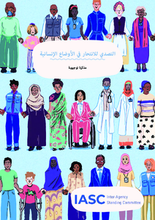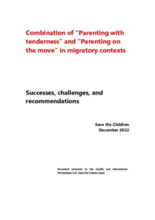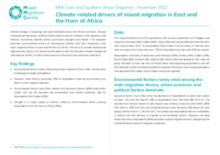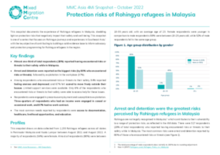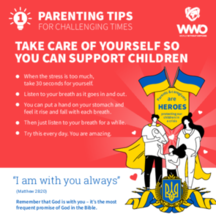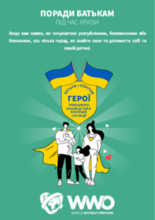Displaying 91 - 100 of 516
تهدف هذه المذكرة التوجيهية إلى دعم منفذي البرنامج والمنسقين والجهات الفاعلة الإنسانية الأخرى في معالجة الانتحار وإيذاء النفس في الأوضاع الإنسانية. إنه يجمع مجموعة واسعة من الأساليب والأدوات والمواد المرجعية وأمثلة الحالة.
Olena Merzliakova, a psychologist and Ph.D. in Psychology, shared effective and simple tips for parents. She is one of the experts engaged for the EU-funded hotline established this summer by the UNDP.
The objective of this Save the Children Spain document is to gather the key findings of the combination of “Parenting with tenderness” and “Parenting on the move” in migratory contexts. It also seeks to improve the quality of its implementation in the context of Mexican migration, based on good practices and lessons learned.
This snapshot produced by Mixed Migration Center examines environmental drivers of international mobility and their interactions with other migration drivers in East and the Horn of Africa. The aim is to provide national and regional policy actors with some empirical data on the links between climate change and international mobility, to inform discussions on future activities and policy directions.
The Institute on Statelessness and Inclusion (ISI), Child Identity Protection (CHIP) and supporting organizations convened a symposium focusing on “The Child’s Right to Identity in Emergency Settings”. The symposium delved deeper into the challenges of protecting and preserving identity rights, including nationality rights, for children on the move and children affected by armed conflict. It examined how children’s identity rights are undermined in emergency settings, the increased risk of statelessness and the need for urgent action on repatriation, reintegration and reunification of children affected by armed conflict.
This snapshot documents the experience of Rohingya refugees in Malaysia, shedding light on protection risks that negatively impact their safety and well-being. This snapshot is one of a series that focuses on Rohingya journeys and experiences in Southeast Asia, with the key objective of contributing to building a solid evidence base to inform advocacy and protection programming for Rohingya refugees in the region.
The "Children of War" platform was created on behalf of the Office of the President of Ukraine as a tool for finding children, rescuing them and liberating them from places of forced displacement or deportation.
МЕТОЮ ЦЬОГО ДОКУМЕНТУ З РЕКОМЕНДАЦІЯМИ є надати певну рамку для підтримки фахівців-практиків і посадовців, відповідальних за вироблення політики у сфері опіки та піклування над дітьми, як в Україні, так і в країнах, які приймають біженців, у рамках заходів реагування, що стосуються опіки та догляду за дітьми в контексті України у відповідності до міжнародних стандартів і належної практики у сфері опіки та піклування та забезпечення альтернативних форм догляду.
This video and attached parenting tips offer simple and practical recommendations for Ukrainian parents on how to help themselves and their children to overcome various crisis situations.
У цьому відео ми пропонуємо прості і практичні рекомендації про те, як у цей непростий час допомагати собі та своїм дітям долати різні кризові ситуації.

